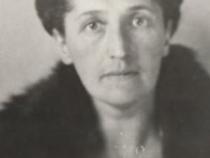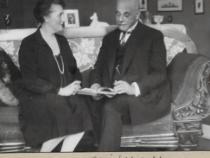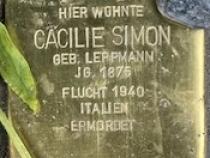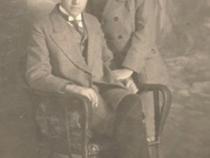Cäcilie Simon was born in Berlin on 24 December 1875, the daughter of the merchant Josef Leppmann and his wife Elisa (née Engel). On 3 March 1898, she married the merchant Ephraim Gotthold Simon. The couple had three sons: Ernst Robert (*15.03.1899), Friedrich Max, later Fritz Michael (*19.09.1901) and Hans Rudolf (*24.07.1908). Initially living at Tauentzienstraße 12B (Berlin-Charlottenburg), Ephraim and Cäcilie moved with their youngest son Hans to Siegmunds Hof 13 in Berlin-Tiergarten in 1933.
Both Ernst Robert and Fritz Michael Simon had already emigrated to Palestine in the 1920s. In 1934, the youngest son Hans also fled to France. In 1936, Cäcilie visited her sons in Palestine, but returned to Berlin against their wishes. After the death of her husband on 21 November 1938, Cäcilie suffered increasingly from the anti-Semitic repression of the Nazi regime. Her assets were successively seized from her in the course of anti-Jewish laws (e.g., the ‘Goldzoll,’ ‘Judenabgabe,’ ‘Auswanderabgabe,’ and ‘Reichsfluchtsteuer’). In 1939, she was evicted from her flat at Siegmunds Hof 13 (Berlin-Tiergarten) as a result of the ‘Law on Tenancies with Jews’ and had to move to the ‘forced house’ at Augsburger Straße 62 (now Fuggerstraße 31) in Berlin-Schöneberg. She had to ‘sell’ large parts of the inventory of her 9-room apartment for far too low a price, and she had to pay for the ‘storage’ of other furniture herself. Cäcilie wrote in a letter on 4 April 1939: ‘The last few days were the most horrible thing I have experienced... alone with 10-12 men who were not satisfied with any tips, who fleeced me, the expenses were much greater than the transport to the storage facility.’
As her son Fritz Michael later stated, Cäcilie was ‘strongly anti-Zionist [...] and under normal circumstances would never have had the idea of leaving Germany and emigrating to Palestine if she had not been forced to do so by the persecution of Jews, which had been particularly severe since November 1938’. So in March 1940, after her sons had obtained an immigration permit for Palestine for her, Cäcilie got ready ‘head over heels’ and fled to Trieste (Italy). She instructed a Berlin forwarding agent to forward her belongings, but he stole from her—the forwarding never took place. She agreed to the capitalization of her widow's pension with the Mannesmann company, to which the ‘Hahnsche Werke’—her husband's former company—was sold in the course of ‘Aryanization.’ Cäcilie never received this sum of RM 36.000,- either. As a result, she lived ‘very poorly’ in Trieste from a small amount of support from the Jewish community, from donations from friends, from giving lessons in English and from knitting.
The steamer journey from Trieste to Palestine had already been paid for; however, her immigration permit was declared invalid and her escape was ultimately prevented. Traces of Cäcilie Simon are lost in Trieste; her last sign of life comes from a letter dated 24 December 1943. She may have been murdered by the Nazis while still in Trieste or deported in June 1944.
Her sons survived the Nazi regime: Ernst Simon became a well-known religious philosopher, educationalist and historian in Israel and was involved in the founding of the Leo Baeck Institute alongside Hannah Arendt and Martin Buber. Fritz Michael Simon served as Israeli ambassador in Peru, Bolivia and Austria, among other places. Hans Simon became a chemist and lived in the USA from the the late 1950s.
Cäcilie Simon was only declared dead on 27 November 1952 by a decision of the Schöneberg district court in the course of her sons' restitution claims against the German Reich.
Cäcilie Simon née Leppmann
Location
Siegmunds Hof 13
District
Hansaviertel
Stone was laid
30 May 2024
Born
24 December 1875 in Berlin
Escape
1940 Italien
Murdered








